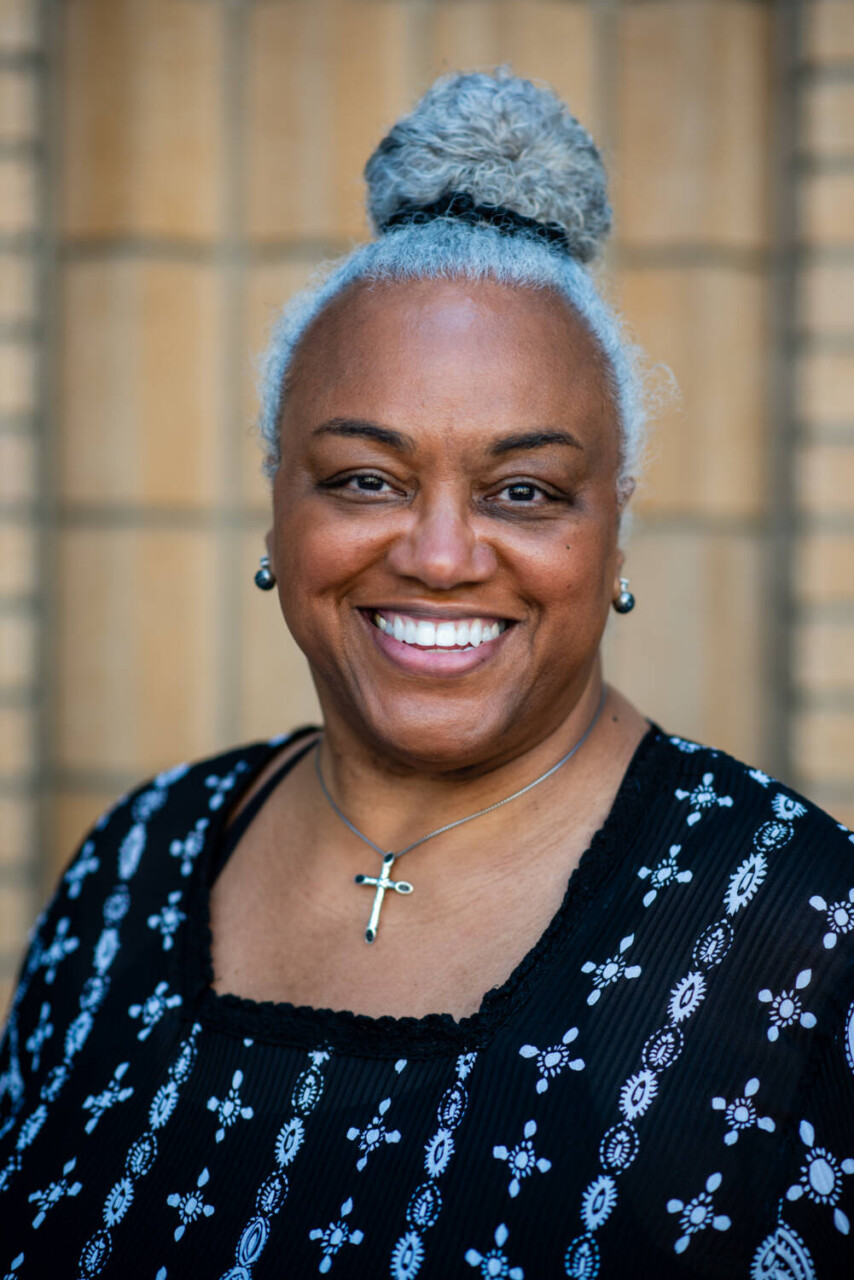
by Dr. Tiffany Caesar
Bred in the Bay, Lisa Tealer is not new to this – she is true to this! It is by no coincidence that after 30 years in the biotech field she would find herself as the executive director of the extremely impactful nonprofit in San Mateo County, Bay Area Community Health Advisory Council (BACHAC), focused on improving health in the African American community.
From Bayview Hunters Point and Haight-Ashbury in the Western Addition
Native to San Francisco, her dad was from Double Rock in Bayview Hunters Point and her mom was from the Western Addition. While growing up primarily in the Haight-Ashbury in the Western Addition, she wondered how her folks from two different locales that were pretty distant from each other found themselves together: “Black folks in the Bayview didn’t always mingle with the Black folks in the Western Addition.”
However, they met at a Booker T. Washington Community Service Center dance. Migrating from the South, like many other African Americans in the Bay, they saw California as a place to get a good job, whether that was working in the shipyards or being an educator. Her father’s family was from Corpus Christi, and his mother was Mexican. Her mother’s people came from Mobile, Alabama, and parts of New Orleans, Louisiana. Yet, her parents, from Southern and diverse families, found themselves dancing together in the middle of the Bay at the Booker T. Washington Center.
Both her parents were educators and very active in the community. Her father was the first Black dean of City College in San Francisco. Growing up in the ‘60s, she watched her family participate in various forms of organizing and giving back to the community. She affirms, “It was just in my DNA.”
Tealer recalls her family on her mom’s side always doing volunteer work: “I remember my grandparents on my mom’s side were always doing things at the church … They were raised as Catholics … and they were creating bake sales, volunteering, helping the nuns, helping the kids at the school … That was just a part of our makeup, that’s just what you did.”
She followed the map of her parents, prioritizing education. After attending schools of the Sacred Heart in San Francisco, she graduated from Mills College in Oakland, with a degree in Biology. Even when Tealer and her family moved to San Mateo County, and she engaged in a successful career in biotech, she mentions, “I always had my hand in community and community work.”
Love for one’s community was instilled in Lisa Tealer’s heart from birth; providing resources for those in need was as normal as breathing air. She remembers her grandmother’s old saying, “Idle hands are the devil’s workshop.”
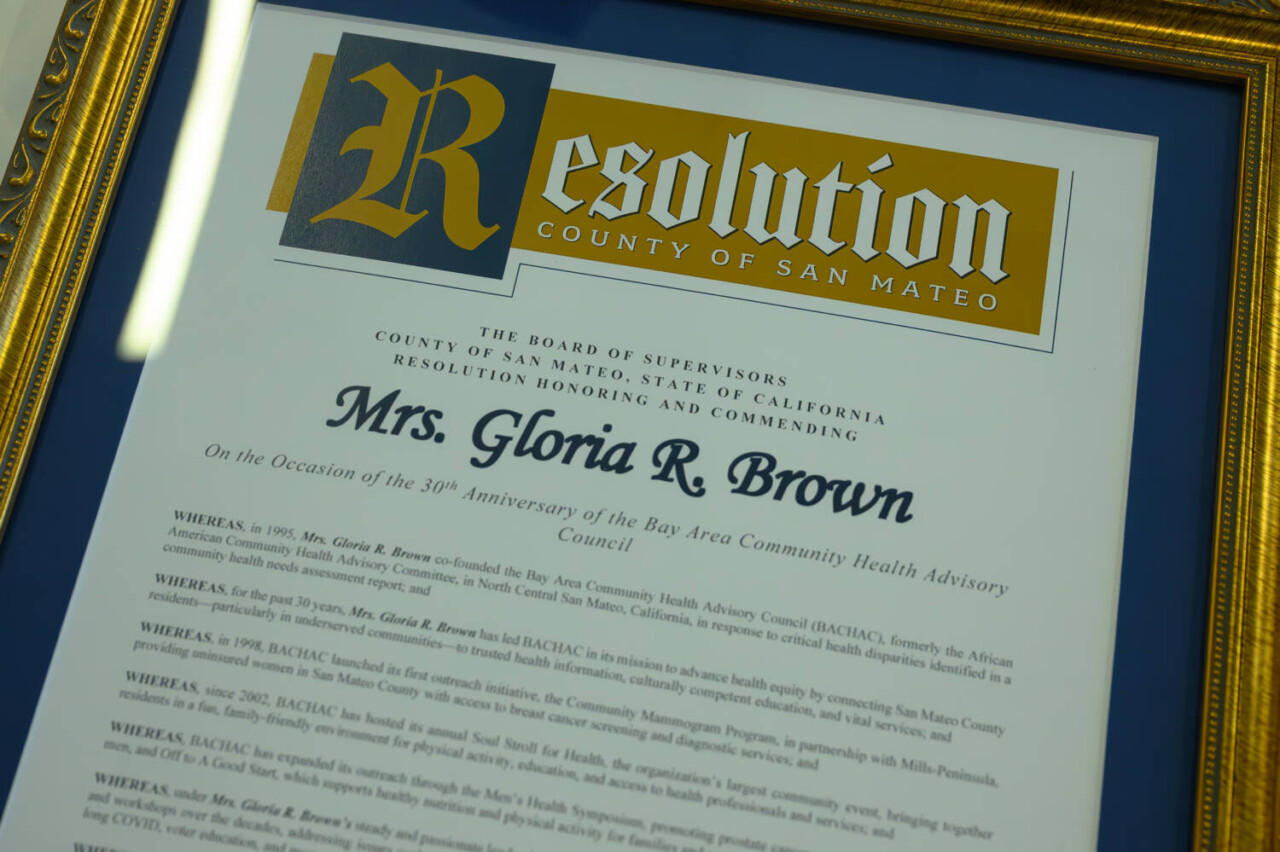
Resolution honoring and commending Mrs. Gloria Brown, co-founder of BACHAC. – Photo courtesy of BACHAC
Stars align with a flyer from BACHAC
One day at the Mills Peninsula Medical Center, Tealer saw a flyer for a Breast Cancer Awareness Program by the Bay Area Community Health Advisory Council. Very excited by the information presented to her, she went to the event. She was immediately pulled into the BACHAC.
She remembers the event like it was yesterday: “I was like … here are my folks … and the icing on the cake was that the program was excellent … They had experts around breast cancer and breast cancer prevention … There was a breast cancer survival fashion show, so all the women in the fashion show were black cancer survivors … so I was like who was the organizer of this because I want to be involved … and everyone said Gloria Brown.”
Lisa Tealer had attended one of Bay Area Community Health Advisory Council’s signature events on breast cancer awareness. She shared, “Their oldest running program in their community is their mammogram program…it was started with Mills Peninsula Medical Center.” The Community Mammogram Program has been in existence for 27 years. The BACHAC has seen over 300 women get free mammograms, and there has been an increase in the last three years. Tealer shared that the organization hopes to increase the number of women seen by 20%. In speaking about the success of the program, she mentions, “We had folks who caught it early or they felt a lump or they couldn’t feel it, but it came up on their mammogram … so we are very proud of that program.”
The Breast Cancer Awareness Program led Tealer to volunteer for the organization for 10 years before she was convinced to take leadership in the organization, as she was retiring from her biotech field. Over the years, Lisa Tealer has led some of BACHAC’s most prominent programs, including Soul Stroll, Prostate Cancer Screening, Mental Health Initiatives, and other health awareness activities.
The Soul Stroll, an extensive health fair that brings diverse resources to the community – physical activity and medical screenings – has been in existence since 2002. The BACHAC’s co-founder Ms. Gloria Brown noticed a need for such a program. Staff and volunteers come together once a year to provide the community with many resources during Soul Stroll. If you are ever looking for an organization to support, definitely consider BACHAC. You can view their website for more information and email them at volunteer1@bachac.org or info@bachac.org. You can call the BACHAC at 650-204-1611 to get involved.
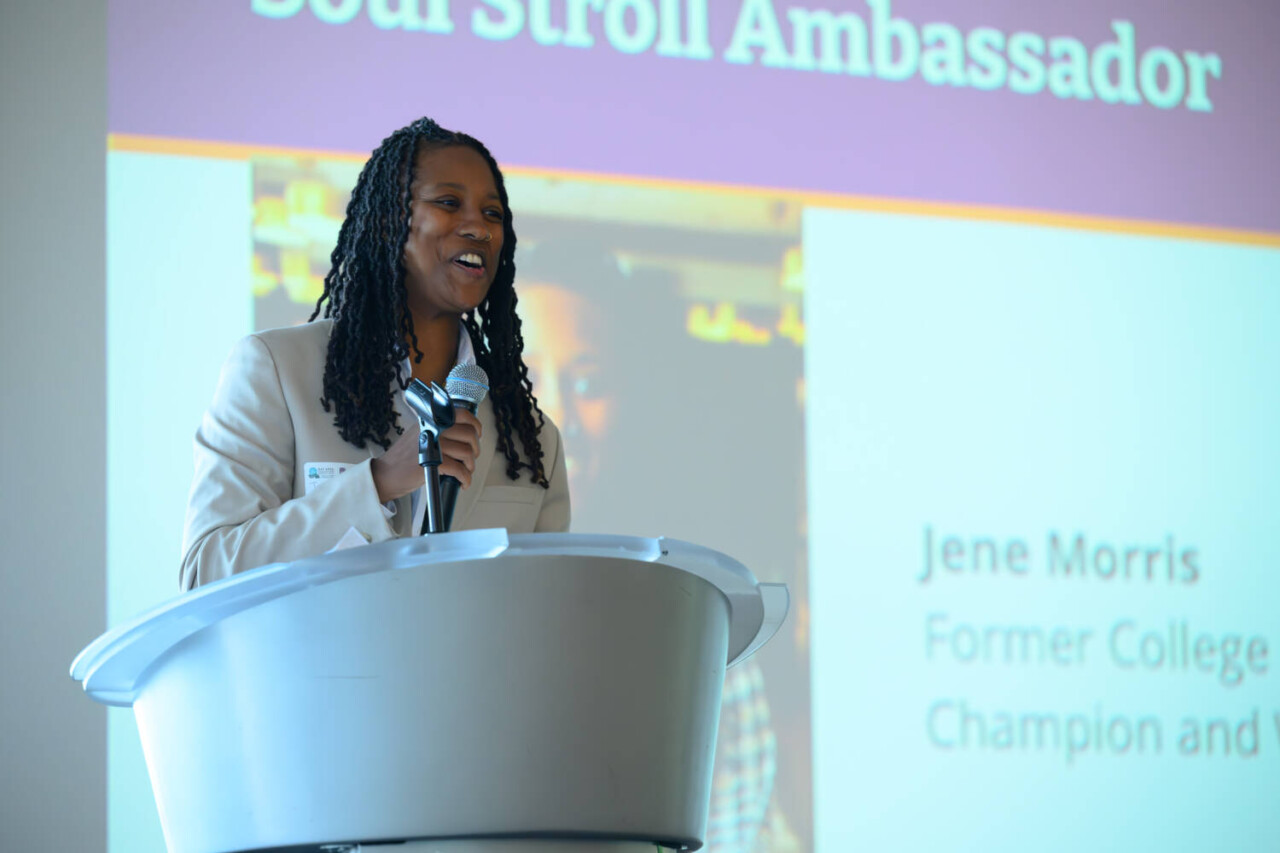
Soul Stroll Ambassador Jené Morris, former WNBA player, speaks at the reception. – Photo courtesy of BACHAC
Equitable pay and nonprofits
The road to leading a nonprofit comes with its own set of financial challenges that Tealer had to learn to navigate early. She mentioned, “My first year or two of being the director, I would talk about money and folks would be like, ‘Aren’t you going to do this for free?’”
She recalls earlier during her tenure, a biotech company wanted BACHAC to help them recruit for a breast cancer study. She asked for their budget, and they did not have one. It was a silent expectation that the BACHAC would not expect anything for their hard labor. I said, “You are asking folks for their time, their expertise, their relationships, their reputation, to recruit a study for YOU? Ummm, the least you can do is provide some funding.”
Needless to say, that project did not go very far. Community organizations and nonprofits are often sought after for their services, but the speed to pay them is not always considered. However, Tealer placed emphasis on valuing her team, their organization’s service, and compensating her workers with a livable wage. In addition, if BACHAC needed a service, they wanted to be able to pay as well. “If I’m asking folks to pay us, then I also want to be able to pay others.”
She continues: “I came from corporate, and when we brought in consultants, they got paid for their time and expertise, so your asking these organizations to do the same thing is no different. They should be getting compensated for their time. So we’re just now turning that corner where folks are realizing that if you want to engage in the community, besides developing a trust and a relationship, you are going to also have to compensate them for their time.”
Tealer shared that you are constantly looking for donations, grants and resources for your organization. BACHAC is known to ask for resources; at the same time, the worth of their work earned much respect from not just San Mateo County, but the greater Bay Area community. They are known to follow through and bring great benefit to their community surrounding their health initiatives.
In Nonprofit Fundraising 101 by Darian Rodriguez Heyman with Laila Brenner, he shares, “Fundraising is an act of love.” Lisa Tealer also feels the same as she relentlessly advocates for resources for her organization.
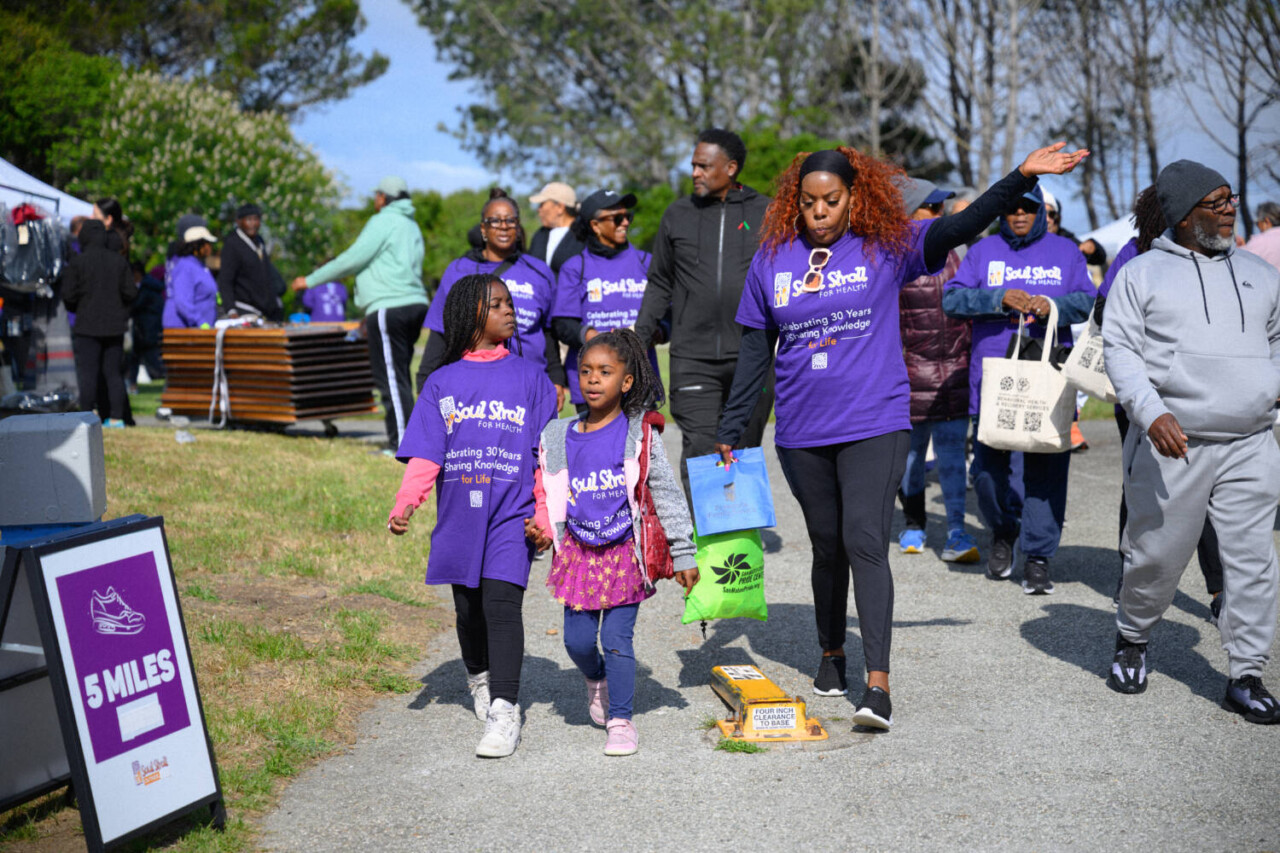
A black family walks in the Soul Stroll. -Photo courtesy of BACHAC
Continuing leadership with self-care
Tealer is aware of the toll running a nonprofit can take on you, especially as a Black woman leader. She shares,“If I can give advice to anyone, … make sure you create some time for yourself, to do whatever it is – reading, walking, meditating – I would encourage folks … because then you can do all the other stuff that you are doing.”
She reminds us of the urgency of taking care of yourself: “Put on the mask before you can help others, because the way community works, it is soul work, and you give your all to it … every fiber in your being … but that can also be harmful to oneself.”
Previously, Councilwoman and Belle Haven Action Executive Director, Honorable Cecilia Taylor, shared in another article the alarming number of Black women dying in America and the need for Black women in leadership to rest, “Too many of us have died because we didn’t take care of ourselves at 40 years old, at 20 years old … And it’s because we have constantly put someone else above ourselves. The movement will be here. It ain’t going nowhere.”
A lot of times Black women are asked to bear the toll without the room for rest, rejuvenation, and relaxation. The stress is amplified for Black women in nonprofits who are expected to do a lot with only a little. According to an article titled “The more you know: Key facts about Black nonprofit leadership,” 64% of Black nonprofits are led by Black women, but many of their budgets are under $50,000, described as chronic underfunding.
Despite these adversities, Black women have to overcome. Over the years, a strong counterculture has emerged to oppose the grind culture on Black bodies, and, as Nap Minister Tricia Hersey shares, “Take a nap!”
One way Tealer finds solace is through visiting her family. She reminds all community workers to spend time with family: “I am trying to spend more time with my family – my mom is 87 – and so I want to spend as much time with her as I can … And I’m grateful that she lives with me, so I see her every day … So I definitely would encourage folks to spend time with their family, as much as they can. That e-mail, that meeting, you know it will be there, but your family members may not.”
While Tealer is rejuvenating from a long year of advocating for Black health, taking time to care for family and running the BACHAC, the rest of us will be waiting for their next Soul Stroll!
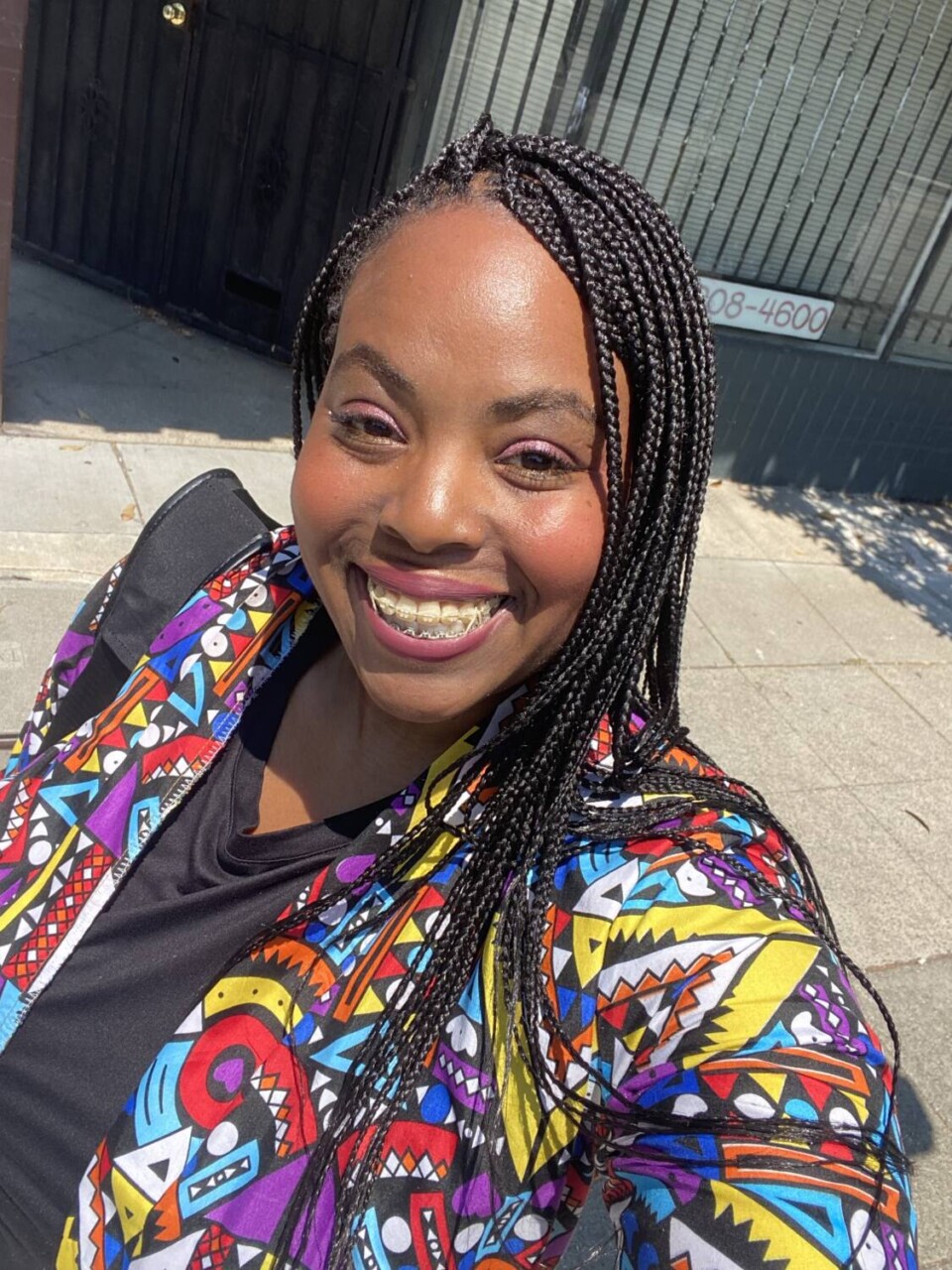
Dr. Tiffany Caesar is an Oakland-based writer, scholar, artist and activist. Her work emphasizes the preservation of Black cultural heritage institutions, Africana women and leadership, Pan-African political movements, reparations and self-care. She is currently an assistant professor of Africana Studies at San Francisco State University, where she teaches African American History and Black Lives Matter: Race and Social Justice Movements. Dr. Caesar also serves as the SF Bay View Volunteer Student Internship Coordinator. She can be reached at drcaesar@sfbayview.com.




